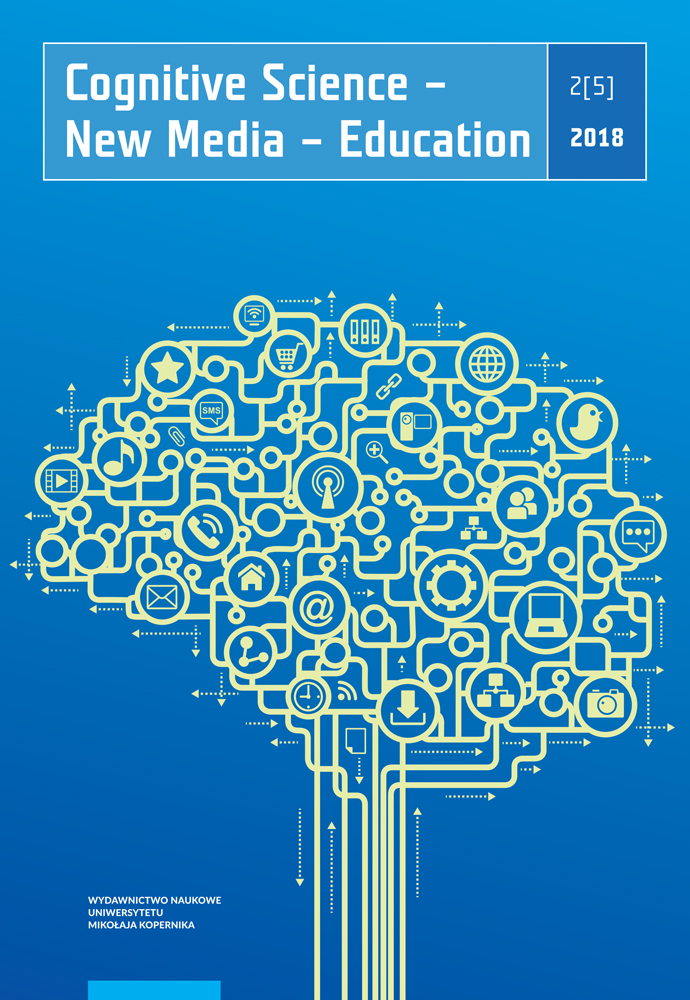Social realism and in-depth learning: Can students build knowledge with an epistemic dimension?
DOI:
https://doi.org/10.12775/CSNME.2018.008Słowa kluczowe
social realism, in-depth learning, specialized knowledge, knowledge building as theory development, knowledge paradox, neoliberal school reformsAbstrakt
A mantra in today's technology-rich schools, with access to the internet and all sorts of information, is that students themselves should produce knowledge. In today's school, characterized by an unholy alliance between neo-liberal forces and constructivism, this requirement will most likely lead to a state in which knowledge is perceived as a form of social construction in a particular setting. This article raises several serious objections to such an approach, which reduces knowledge to knowing, which limits the scope for progression in the subject. This paper argues for a social and realistic alternative, formulated as knowledge building as theory development. Knowledge building as theory development exceeds the subjective doxa by linking knowledge with development of ideas and theories as the essential part of the students' creation of knowledge. Knowledge building as theory development opens up for students to build knowledge with an epistemic dimension, which is a prerequisite for in-depth learning in the school's subjects.
Bibliografia
Bereiter C. & Scardamalia M. (2010), Can Children Really Create Knowledge?, "Canadian Journal of Learning and Technology", 36(1).
Bhaskar R. (1998), The possibility of naturalism: a philosophical critique of the contemporary human sciences (3rd ed. ed.), London: Routledge.
Bratland E. (2016), Reform, competence and knowledge: paradoxes of knowledge in the neoliberal transformation of education [in:] E. Bratland, Sieminiecka, D. & Siemieniecki, B. (Ed.), Knowledge, ICT and education - a variety of perspectives (pp. 117-132). Toruń: Adam Marszałek.
Chuy M. et al. (2010), Understanding the Nature of Science and Scientific Progress: A Theory-Building Approach, "Canadian Journal of Learning and Technology", 36(1), doi:10.21432/T2GP4R
Collier A. (1994), Critical realism: an introduction to Roy Bhaskar's philosophy, London: Verso.
Disessa A. A. (1993), Toward an Epistemology of Physics, "Cognition and Instruction", 10(2-3), p. 105-225. doi:10.1080/07370008.1985.9649008.
DiSessa A. A. (2000), Changing minds: Computers, learning, and literacy. Cambridge: The MIT Press.
Erstad O. (2010), Kunnskapsbygging i kulturhistorisk perspektiv - materialitet, mediering og utforskende arbeidsmåter Kunnskap i skolen, Trondheim: Tapir akademisk, pp. 113-114.
Furberg A. & Lund A. (2016), En profesjonsfaglig digitalt kompetent lærer? Muligheter og utfordringer i teknologirike læringsomgivelser [in:] R. J. Krumsvik (Ed.), Digital læring i skole oglærerutdanning (2. utg. ed., pp. 26-48). Oslo: Universitetsforlaget.
Greeno G. J. (2006), Learning in activity [in:] R. K. Sawyer (Ed.), The Cambridge handbook of the learning sciences, Cambridge Cambridge University Press, pp. 79-96.
Lipman M. (1988), Philosophy goes to school, Philadelphia: Temple University Press.
Lund A. & Hauge T. E. (2011), Designs for teaching and learning in technology-rich learning environments, "Nordic journal of digital literacy" (4), p. 258-272.
Maton K. (2014), Knowledge and knowers: towards a realist sociology of education, New York: Routledge.
Maton K. & Hood S. & Shay S. (2016), Knowledge-building: educational studies in legitimation code theory, Routledge, Taylor & Francis Group.
Maton K. & Moore R. (2010), Social realism, knowledge and the sociology of education: coalitions of the mind, London: Continuum.
Meld. St. 28, 2015-2016. Fag – fordypning – forståelse: en fornyelse av Kunnskapsløftet, Oslo: Kunnskapsdepartementet.
Moore R. (2004), Education and society: issues and explanations in the sociology of education, Cambridge: Polity.
Popper K. R. (1972), Objective knowledge: an evolutionary approach, Oxford: Clarendon Press.
Popper K. R. & Notturno M. A. (1994), Knowledge and the body-mind problem: in defence of
interaction, London: Routledge.
Sawyer R. K. (2006), The Cambridge handbook of the learning sciences, Cambridge: Cambridge University Press.
Scardamalia M. & Bereiter C. (2006), Knowledge building: theory, pedagogy and tecnology [in:] R. K. Sawyer (Ed.), The Cambridge handbook of the learning sciences, Cambridge: Cambridge University Press, pp. 97-115.
Statsministerens kontor (2018), Retningslinjer for utforming av nasjonale og samiske læreplaner for fag i LK20 og LK20S, Oslo: Kunnskapsdepartementet.
Thagard P. (2000), Coherence in thought and action, Cambridge, Mass: MIT Press.
Wheelahan L. (2010), Why knowledge matters in curriculum: a social realist argument, London: Routledge.
Wilensky U. & Reisman K. (2006), Thinking Like a Wolf, a Sheep, or a Firefly: Learning Biology Through Constructing and Testing Computational Theories – An Embodied Modeling Approach, "Cognition and Instruction", 24(2), p. 171-209, doi:10.1207/s1532690xci2402_1
Young M. F. D. (2008a), Bringing knowledge back in: from social constructivism to social realism in the sociology of education, London: Routledge.
Young M. (2008b), From Constructivism to Realism in the Sociology of the Curriculum, "Theory and Research in Education", 5, (2), p. 173-201.
Pobrania
Opublikowane
Jak cytować
Numer
Dział
Statystyki
Liczba wyświetleń i pobrań: 1987
Liczba cytowań: 0



